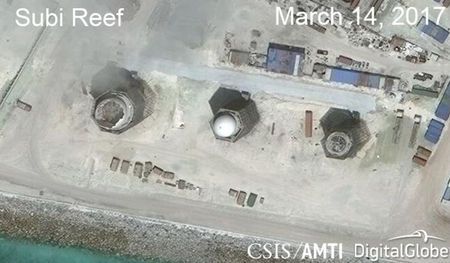Media Report

- Reuters reports: "China appears to have largely completed major construction of military infrastructure on artificial islands it has built in the South China Sea and can now deploy combat planes and other military hardware there at any time, a U.S. think tank said on Monday. The Asia Maritime Transparency Initiative (AMTI), part of Washington's Center for Strategic and International Studies, said the work on Fiery Cross, Subi and Mischief Reefs in the Spratly Islands included naval, air, radar and defensive facilities. The think tank cited satellite images taken this month, which its director, Greg Poling, said showed new radar antennae on Fiery Cross and Subi. 'So look for deployments in the near future,' he said.China has denied U.S. charges that it is militarizing the South China Sea, although last week Premier Li Keqiang said defense equipment had been placed on islands in the disputed waterway to maintain 'freedom of navigation.' China's Defense Ministry did not respond to a request for comment. Chinese Foreign Ministry spokeswoman Hua Chunying said on Tuesday she was unaware of the details of the think tank's report, but added the Spratly Islands were China's inherent territory."
- The Washington Post reports: "A Taiwanese pro-democracy activist believed to be in Chinese custody may have attracted the attention of China's security services after he used the social media site WeChat to discuss China-Taiwan relations, a colleague said Tuesday...Cheng Hsiu-chuan, president of Taipei's Wenshan Community College where Lee has worked for the past year as a program director, said it's likely that Lee attracted the attention of Chinese security last year after using WeChat to 'teach' an unknown number of people about China-Taiwan relations under the government of Taiwan President Tsai Ing-wen. 'For China, the material he was teaching would be seen as sensitive,' Cheng said. WeChat has millions of active users and is hugely popular as a means of communication in China...[His wife,] Lee Ching-yu said a Taiwanese government agency also told her this week it had indirect information pointing to a Chinese state security detention...Police and government officials in southern China either could not be reached or said they had no information about Lee. China's foreign ministry said it was unaware of his case."
- NPR reports: "On the fringes of Beijing, surrounded by affluent housing compounds and the headquarters of some of China's leading high-tech firms, there's a slum folks call Didi Village...Many of the village's inhabitants are migrant workers who, until recently, worked for Didi Chuxing, China's largest ride-hailing service. In China, A Battle Uber Didn't WinOne of them, 35-year-old Wang Fei, started driving last July. Back then, he recalls, Didi and its main competitor, Uber, were locked in a price war. They were offering bonuses to drivers and steep discounts to riders in order to grab market share. 'We got into this business because of the bonuses,' he recalls in an interview in the village. 'Without them, there's no point. And then, they started banning out-of-town cars and drivers.' These bans were announced by some local governments in January, apparently intended to protect local jobs and keep migrants from swelling urban populations...Wang Jun, an expert on corporate law at China University of Politics and Law in Beijing, describes the local rules as a step backward...'On one hand, they considered the jobs created by ride-hailing services,' he says. 'But on the other, they also considered the taxi driver's income, and the interests of the taxi companies.'...'Our main concern is that the regulations will kill off this fledgling industry,' he says, 'in which case the taxi industry won't improve, and people's transportation won't get better.' "
Calendar
- 2017-03-27 China’s influence on global finance grows as US scales back input
- 2017-03-26 Beijing-backed Carrie Lam chosen as next Hong Kong leader
- 2017-03-24 South China Sea Reefs Need Defending, China Premier Li Says
- 2017-03-23 China says U.S. should respect China's air defense zone
- 2017-03-22 China’s extreme income inequality finally appears to be falling
- 2017-03-21 China steps up battle against property bubble
- 2017-03-20 In China debut, Tillerson appears to hand Beijing a diplomatic victory
- 2017-03-19 Rex Tillerson, Xi Jinping Meet In China As Secretary Of State Wraps Asia Tour
- 2017-03-17 What Should China and the US Do About North Korea?
- 2017-03-16 5 Questions Tillerson Will Have to Answer in Asia
News
- Reuters China able to deploy warplanes on artificial islands any time: U.S. think tank
- The Washington Post Colleague: Missing Taiwan activist talked politics on WeChat
- NPR In China, Like In The U.S., The Fight Over Ride Hailing Is Local
- The Wall Street Journal Chinese Conglomerate HNA Seeks Stake in Airport Retailer Dufry
- Bloomberg Unreachable Huishan Executive Exposes China Debt, Bank Risks
- The New York Times Didi Chuxing, China's Ride-Hailing Giant, Holds Talks With SoftBank
- The Financial Times China plans fresh crackdown on Tangshan steel production
- The New York Times On State TV, Chinese Forces Storm a Compound a Lot Like Bin Laden's
- Bloomberg How China's Bank Behemoths Make Money on the Debt War
- The Washington Post Australia shelves planned extradition treaty with China
- Reuters China army drills on Myanmar border amid tensions
- The Financial Times Chinese 'facilitators' seek boom in organ donors
- The Wall Street Journal Olympic Athletes Have Nothing on China's Lunch-Delivery Guys
Commentary
- Center on Foreign Relations China's Estimated Intervention in February
- Foreign Policy 3 Strategies U.S. Trade Partners Should Pursue Post-TPP
- Forbes Rex Tillerson's Trip To China Shows He Prioritizes Private Action Over Public Words
- The Diplomat China's Premier Li Tours Australia, New Zealand
- Quartz China is desperately trying to save a dairy company that, turns out, is too big to fail
- National Geographic China Poised for Leadership on Climate Change After U.S. Reversal
- The National Interest The Real South China Sea Crisis Everyone Is Missing
